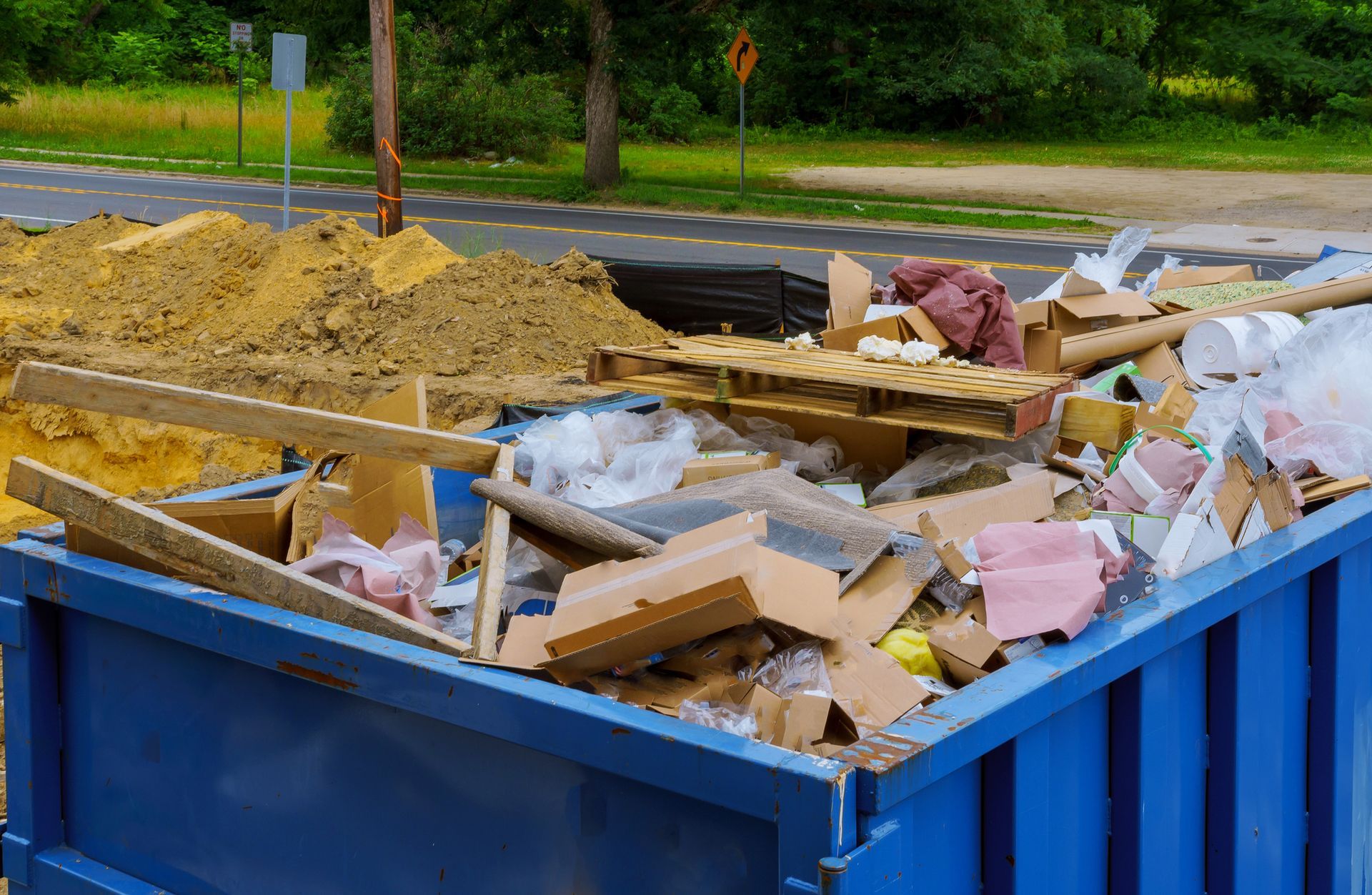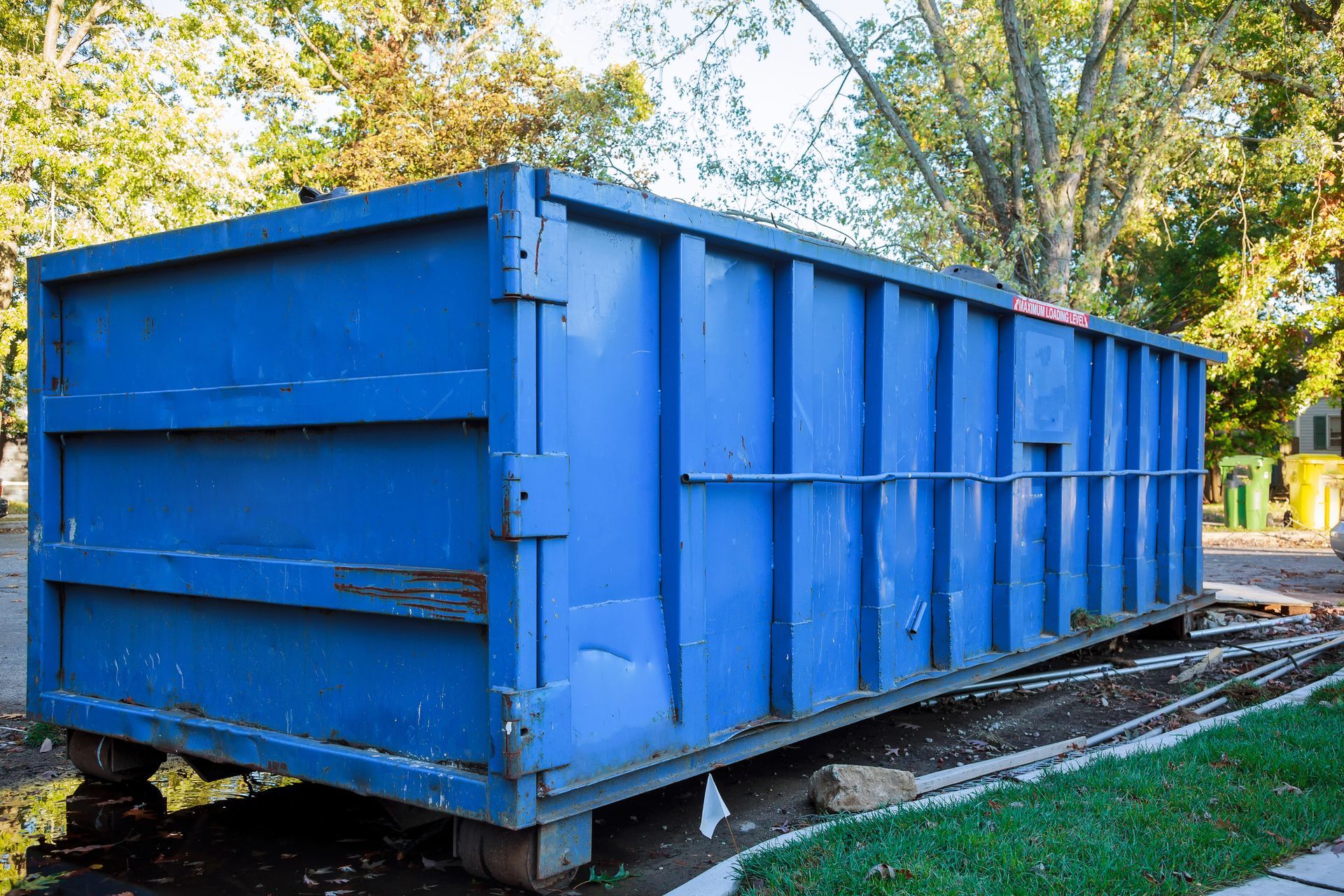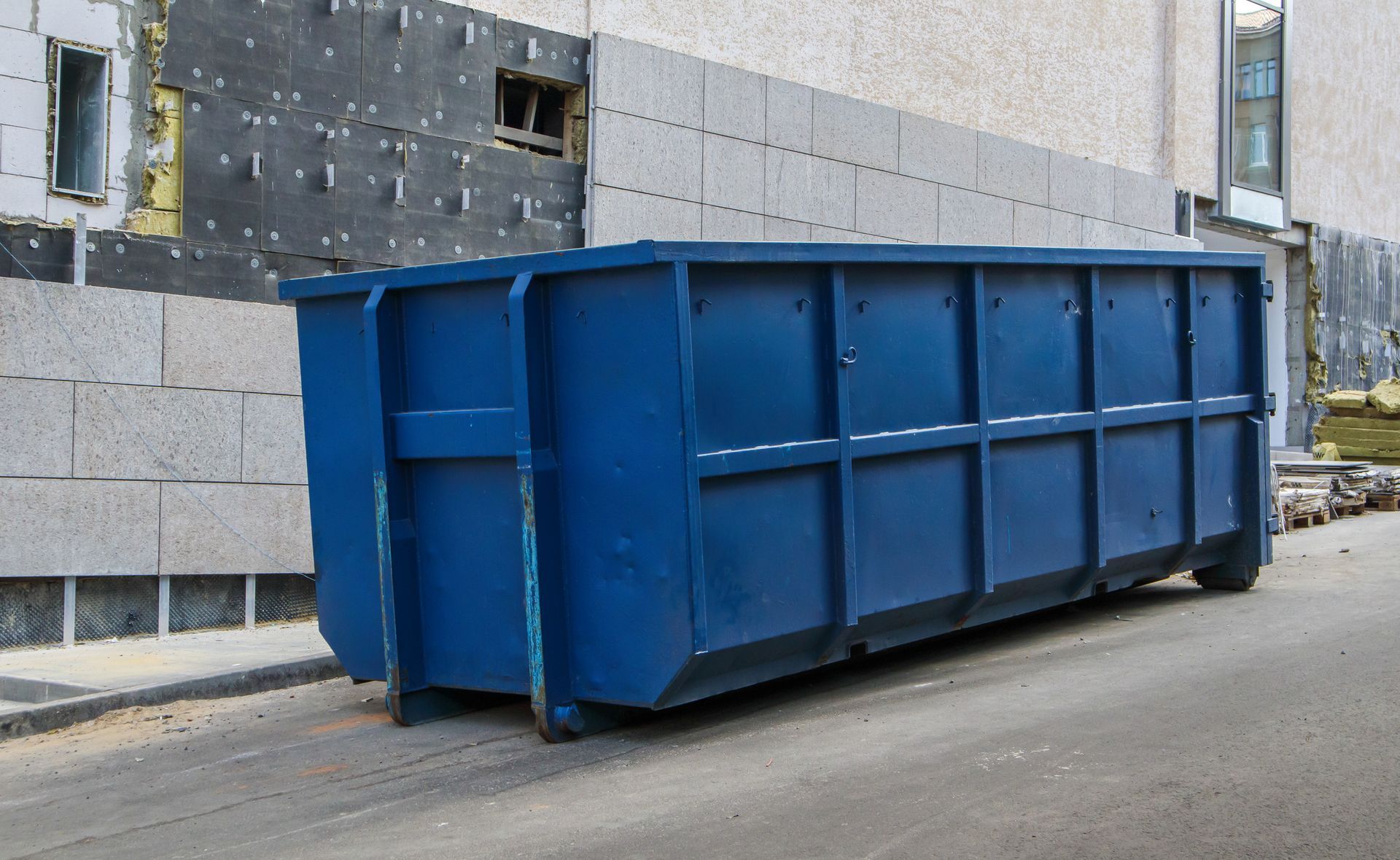What Can and Cannot Go into a Dumpster
Ready to tackle a major clean-up for your residence or business? Consider renting a roll-off dumpster to assist in disposing of unwanted items and trash you have accumulated. A roll-off dumpster is ideal for when you need to dispose of a lot of trash at one time. A roll-off dumpster can be delivered to your driveway or in front of your house. There is no risk of damage to your driveway or road and you will have easy access to dispose of the various items you no longer want. Your waste disposal company can advise you on the size dumpster you will need for its delivery and pick up.
While it is tempting to think you can throw all unwanted items in a dumpster … and that is true of most items – but there are some limitations. It’s important to know what can go into it as trash.
Perhaps it’s better to know what NOT to throw into a dumpster. These limitations are usually imposed for environmental or safety reasons.
Items that are Banned from a Dumpster
The Commonwealth of Massachusetts bans some categories of solid waste from the waste stream. These items are not allowed in dumpsters and dumpster rentals because of their potentially harmful effects on the environment and on individuals. These categories include:
Consumer Electronics: Cell/smart phones, DVD/MP3 players, pagers, PDAs, game consoles, and other electronic devices.
When disposed of, electronic devices tend to break apart and the components within can leak out and become hazardous material. Even smaller electronics, such as flashlights, clocks, and mp3 players, contain chemicals and other materials that become dangerous in a landfill.
Flatscreen TVs
If you need to dispose of a flat screen TV, there are options you can explore. (Many states, including NJ, PA, and RI have made it illegal to put TVs in a landfill.)
- Visit your local recycling and waste website. Each state or county has different recycling rules and options when it comes to flat screen TVs and other electronic devices. Some states offer curbside recycling pick up service. Others offer a list of places you can bring your electronics to be recycled.
- Drop off your flatscreen TV with certain manufacturers. The Environmental Protection Agency (EPA) has a list of companies that offer recycling services. Sony, Samsung, and Vizio, among others let you bring your used TVs into a central location to be recycled. Check out a list of these manufacturers.
- Learn about local electronic drop-off events near you. Many cities have events at schools or businesses where you can bring your electronics to be recycled. Do a quick online search by typing “electronic drop-off event near me” into an online search engine to find results.
- Use a company’s haul-away service to recycle your flatscreen. Companies like Best Buy will come pick up flatscreen TVs that are 50 inches or smaller. Visit the Best Buy website to learn more.
Donate or Sell a Working TV
Restore your flatscreen TV to its factory settings, so that any personal information that resides on your TV is erased. Use the remote to navigate to the Settings option to find the factory reset options.
List your TV on Craigslist for free or for sale. Check your local Facebook Marketplace or selling and/or trading groups on Facebook. Some thrift stores or consignment stores may be interested in your TV as well.
Donate a working TV to your church or local school. Last resort: have a yard sale for your TV and other electronics you no longer want.
Cathode Ray Tubes (CRTs)
CRTs are found in TVs, computer monitors, and flat panel screens and are banned from dumpsters.
Small Appliances
Appliances like microwaves, refrigerators, and toaster ovens contain electronic components that become hazardous when not disposed of properly. Appliances often have batteries, screens and other electronic materials and chemicals in them that should not be put in a dumpster.
Freon Appliances
Older appliances that used freon, including refrigerators, freezers, air conditioners, and dehumidifiers are not allowed in dumpsters.
Batteries
Batteries, including car batteries, alkaline batteries, lithium batteries and rechargeable batteries, should not go in a dumpster. These contain all sorts of chemicals that become hazardous in a landfill. Every type of battery can leak toxic substances into the soil and water, and sometimes they can even start fires.
You should be able to find recycling programs for batteries such as car batteries, rechargeable batteries, and button cell batteries. Try Battery Recyclers of America Battery Recyclers of America – Next Day Battery Recycling in All 50 States or Battery and Cell Phone Recycling in MA
Single use alkaline batteries are another matter. Not every recycling center will take them. However, alkaline batteries are the least dangerous for the environment and may be thrown in the trash as a last resort. (… unless you live in California.)
Tires
You can’t place old tires in a dumpster or a recycling bin as they always require special handling. While old tires can often be recycled into other materials, you can’t put them out with your normal recyclables.
Check with your local tire or auto parts retailers for drop-off and recycle programs. If you have tires that are still in good condition, you may be able to sell them to an auto parts or tire store near you.
Mattresses
Some areas will allow you to throw out a mattress in the dumpster, but there may be specific rules that require you to wrap the mattress in a plastic mattress bag. It’s always best to check the regulations in your area before disposing of a mattress this way. When you replace a mattress it is common for the vendor to take away your old one. You should be aware that in total, mattresses today take up to 800 million cubic feet in landfills and can take up to 120 years for a single mattress to compose!
Paints and Solvents
Don’t throw oil-based paint, lead-based paint, paint thinner, and other similar products in a dumpster. These products can leak into the ground and contaminate groundwater and septic tanks. Never throw wet paint into the garbage.
You may be able to throw away small amounts of non-oil-based paint, if you dry it out first. If you have just a little bit of paint left after a project, dry it out with sawdust, paper towels, or cat litter or let it sit in the sun to harden. Check your local authorities for places to dispose of old oil-based paints.
Oil, Gas, and Pesticides
Oil and gas products like motor oil, lubricants, and petroleum must not be put in a dumpster. These products are toxic, corrosive and flammable and need to stay separate from your other garbage. Dumping gasoline is illegal almost everywhere.
Pesticide should not be thrown in the dumpster, regardless of whether it’s a chemical, granule, liquid, or spray. Pesticides can harm plants, wildlife and even people if you dispose of them incorrectly. Do not throw pesticides in the garbage or dump them in a sink, toilet or sewer drain. Pesticides often require chemical waste services, such as chemical recycling or specialized disposal techniques.
Many municipalities have drop-off programs for these types of waste. Contact your municipality for upcoming events. Check EPA.gov for more information on the disposal of pesticides.
Yard Waste
Yard waste, like grass, leaves and branches takes up valuable space in the dumpster, and these materials can be put to better use as compost. Some municipalities have drop-off centers, and your trash hauler may offer curbside pick-up of specially tagged bags. Home compost kits are also available.
Light Bulbs
Some types of light bulbs should not be disposed of in a dumpster. Fluorescent and compact fluorescent light bulbs contain small amounts of mercury and so you must dispose of them separately from regular trash. If they end up in a landfill, they will contaminate the soil and water.
Recyclables
Please do not throw any recyclables into a dumpster! Check with your local recycling plant to learn about what you are allowed to recycle. Typically, you can recycle cardboard, glass, newspaper, and plastic. Many recyclables can take years to decompose in a landfill, and there’s no reason to fill up the landfill with these materials. You can also contact specialized recycling management companies to recycle items that aren’t included in your town’s regular recycling services.
Items that Can be Placed in a Dumpster
Most household materials that are not hazardous, flammable, or toxic can be thrown in a dumpster. Here is a handy list:
Incandescent, Halogen, and LED Light Bulbs
These items don’t contain hazardous materials. However, it’s best to dispose of them in another disposable material, such as a paper bag, to avoid injuring anyone if they break.
Empty Aerosol Cans
Aerosol cans can explode if they are not completely empty before being thrown in a dumpster. Check to make sure they are empty before tossing them. In some areas, you may be able to recycle them, so check your local recycling establishment to see if you can put them out with your regular recyclables.
Most Furniture
All wood furniture, like chairs, tables and bookshelves, can be thrown away in a dumpster. In many places, you can also throw away upholstered furniture. Check the rules of your local area to find out if they accept upholstered furniture before tossing it out.
Other Trash
Most other household products are safe to throw in your dumpster. This includes items like curtains, carpets, pots, pans, boxes, sinks, books, documents, clothes, non-electronic toys and non-recyclable plastics. If you need to throw out food waste, put it in a trash bag before tossing it in a dumpster.
It is illegal or environmentally irresponsible to throw out banned items into a trash dumpster. If hazardous items end up in a landfill, some of their constituent elements can leak into the soil or groundwater. This can make the soil we plant, the water we drink, and the air we breathe, unhealthful.
We’ll assist with planning and scheduling and can arrange to dispose of some of your banned items safely. Extra fees for special handling may apply for specific items. Please refer to the chart below:
- CRT/TVs
- Air Conditioners
- Refrigerators/Freezers
- Washers/Dryers
- Water Heaters (must be EMPTY)
- Lawn Mowers
- Gas Grills
- Propane Tanks
- Batteries (any size)
- Car tires
- Truck tires
- Couches/Chairs
- Mattresses/Box springs
If you are thinking of renting a dumpster or have questions about rentals, call Pleasant View Waste at 978-365-3244, visit our website or email us.
Share this entry
Leave a reply







